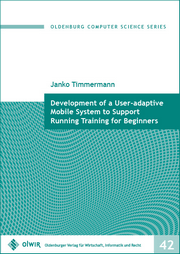Oldenburg Computer Science Series
Univ.-Prof. Dr. Susanne Boll,
Univ.-Prof. Dr. Sebastian Lehnhoff (Hrsg.)
Janko Timmermann
Development of a User-adaptive Mobile System to Support Running Training for Beginners
Physical activity is an important aspect of a healthy lifestyle. Moderate physical activity for a minimum of 30 minutes on five days a week is recommended. Running is a popular activity to achieve this goal, as it employs most muscles and consumes most energy relative to training time. The intensity of a run is an important factor. Among others, the heart rate is a very reliable parameter for an objective assessment of the training intensity and is easy to measure. Consequently, it became the dominant physiological parameter for assessing the intensity. Additionally, the perceived exertion can be used for the intensity assessment. It has been proven, that the perceived exertion strongly correlates with the exertion indicated by the physiological parameters. Using it for intensity assessment allows covering much more para-meters influencing the intensity, like fatigue or muscle ache.
Technical support systems for supporting the running training are a commonly used by runners. Generally, the systems consist of a heart rate sensor and a watch. We present our work on developing a technical support system especially for beginning runners, using a user-centred design approach. We focus on optimising heart rate displays by conveying information not only visually to the runners, but also using vibro-tactile feedback, allowing a constant feedback without the need of looking at a watch. We investigate how the perceived exertion can be assessed technically during a run and introduce the concept of using it in combination with heart rate measurements to optimise the running training.
We contribute with a user-centred development of a tactile heart rate display. We show that a tactile design can effectively support runners. For assessing the perceived exertion, we con-tribute by identifying an input method for the Borg-RPE-Scale allowing to assess the perceived exertion while running. As further contribution, we developed a concept on how heart rate and perceived exertion can be used together in a support system and evaluated an innovative mobile application using this approach and the other concepts we developed in this thesis. Our final contribution is the evaluation of how running groups can be supported technically by analysing opportunities and restrictions in this context with the help of a mobile application.
Bd. 42, XII, 214 S., Edewecht 2017, € 49,80
ISBN-13 978-3-95599-044-2

